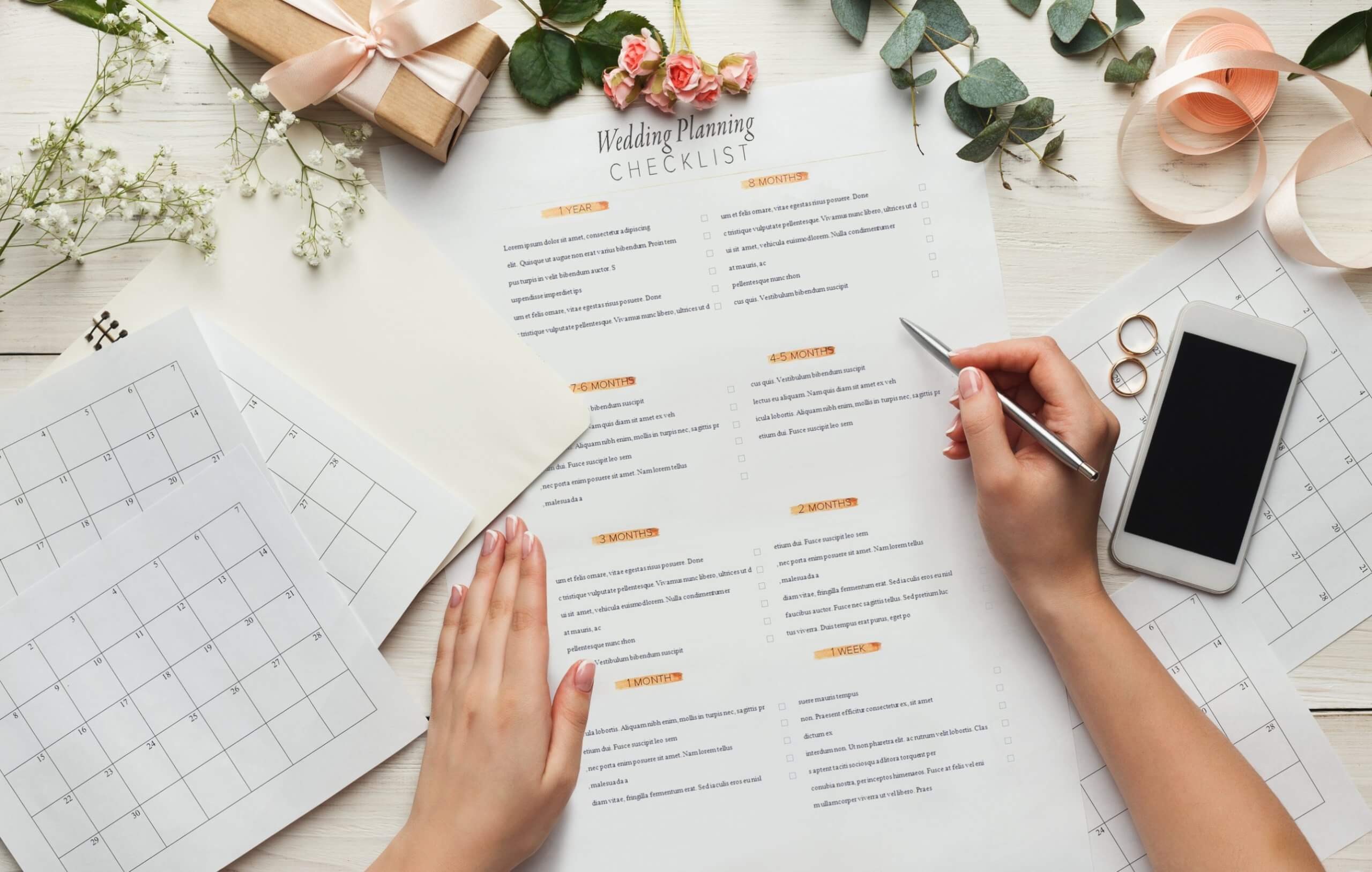Possessing great organisational skills could be the stepping stone you need to start a successful career as a wedding planner.
However, this skill alone won’t be enough to launch you into this job. You will also need special training to ensure that you can handle every aspect and eventuality that can arise from arranging a couple’s special day.
What skills do you need?
As we mentioned above, being a fantastic organiser is just one element you’ll need to excel as a wedding planner.
You will also need to be:
- Creative – Your job will be to take potential ideas from each couple and transform them into tangible and achievable goals. This will require a strong imagination and an ability to think outside the box should obscure requests arise.
- Calm under pressure – Wedding planners play a pivotal role in organising every element of the big day. From those initial ideas to overseeing the actual day, you will have to deal with the good and the bad. This can range from things going awry to items or people going missing/failing to arrive, to complaining/awkward couples, families, and guests; you will be deeply involved in it all. As a result, you need to exude a calming presence so you can resolve anything that is thrown at you with ease.
- Motivated – Alongside being a brilliant organiser, you will need to be able to keep to tight deadlines and resist the temptation to give up when things go wrong. In other words, you have to remain positive and committed to getting the job done.
- Highly driven – Whether you choose to launch your own business or apply to work for a wedding planning agency; you need to be highly driven if you want to build up a strong reputation and portfolio.
- Hard-working – A lot of legwork and research is required for this role as you’ll be expected to scope out venues and various floral, catering, and entertainment suppliers. This means you will work very long hours which will cut into your weekends and evenings. You also need to be prepared for this amount of hard work if you want to keep on top of deadlines and expectations. In turn, you will have to juggle multiple projects and potentially more than one wedding at a time.
- A good communicator – You need to be engaging and capable of working with a variety of people, as you strive to construct their big day. Having strong communication skills is essential to making this happen and ensuring everyone clearly understands their role and requirements. Likewise, you’ll be expected to both advise and listen to your clients, as well as respect their wishes. After all, it is their big day, not yours.
- A strong team leader – You will be responsible for coordinating and managing a lot of people. To do this, you need to command respect and confidence from the people you are working with.
What do Wedding Planners do?
Your primary job as a wedding planner will be to organise weddings and ensure that every aspect of their big day runs calmly, smoothly, and without a hitch.
Most professional wedding planners offer several levels of service:
- Full wedding planning – From those initial formulating stages where you discuss ideas and their budget, to the married couple departing for their honeymoon; you will be deeply involved with organising every last detail of their special day.
- Partial wedding planning – With this level of service, you will be responsible for some but not all aspects of the wedding. For instance, you may be asked to organise some elements of the day while the couple sorts out the rest themselves.
- On-the-day management – Here you would provide support solely on the day itself, working to ensure schedules are kept to and that everything goes to plan.
Now, most couples choose to go with the first two levels of service as it helps to alleviate them of the stress of having to organise it on their own. However, it is important to note that every wedding will be different, and what works for one wedding may not work for another.
Full Wedding Planner Service – what to expect
Should you be asked to perform this role, you will be joining the couple from the very beginning and will be involved in helping them to come up with initial ideas and a budget. Once this is in place, you would be expected to create a proposal showcasing what you can do and what you will charge for your services. If you are working for an agency, then there would likely be a fixed fee; however, this may need to be amended depending on the requests they have made and their overall budget.
If you are working independently, you will have more control over your fees, but again they would be based on the services the couple requires.
At this point, they will either hire you or not.
Should they choose to hire you, you’d then be free to draw up a masterplan of everything that needs to be done, their potential costs, and their latest dates for completion. Once approved by the couple, you would be able to get on with the organisation of the actual event.
Amongst the many things you’d be required to organise, the most common are:
- Compiling a list of possible wedding themes.
- Researching and suggesting multiple venues that are within their budget/requirements and booking them once selected.
- Negotiating with vendors – Such as photographers, florists, cake makers, caterers, and entertainers e.g. bands, DJs, etc. (the client’s budget will always be at the forefront of your planning when negotiating prices). There will be occasions when couples make unusual requests for their weddings, so even with an existing portfolio of contacts, you will need to stay abreast of new trends and suppliers so you can cater to all of their wishes.
- Creating invitations – While clients will need to supply names and addresses and make the final pick; you will be expected to show them an assortment of materials and fonts to choose from.
- Clothing hire – Most couples usually handle this aspect on their own, but some may require advice on the best places for quality suit hire or where to find shoes, etc.
- Transportation – Cars, carriages, helicopters… you will be responsible for providing them with a list of potential suppliers, their costs, and their availability.
What do you need to become a wedding planner?
While a natural affinity for planning and organising events will hold you in good stead, you will instantly strengthen your employability prospects by having the right qualifications and experience in your arsenal – especially if you plan to work on a self-employed basis.
Course Recommendations:
Social media has made it immensely easier for you to promote a business; however, having a website is not enough to get you noticed. To help give your business a competitive edge, you also need to know how to market your services. Online marketing and social media courses can teach you how to navigate the internet and ensure that your website, articles, and posts are getting seen by the right audiences.
As you can easily imagine, a lot of admin and record keeping is involved in the planning of a wedding. From contacting providers and suppliers, to managing payments – you need clear and easy access to all records and materials. Completing an online administration course can teach you how to effectively manage your paperwork and keep it highly organised and accessible.
You won’t just be handling the money the couple pays you for their big pay. You will also have to act as the middle man between them and pay for weddings, transportation, clothing, flowers, catering, venues, etc. As such, you need to know how to manage invoices, track payments and be aware of all monetary in-goings and out-goings. Here is where having a qualification in bookkeeping and accounting can help you (especially if you don’t have an accountant). These online courses can help you to keep track of all of these and ensure you remain profitable.
This is particularly important if you plan to start your own business or work as a freelance wedding planner. This qualification will help to bolster your existing, natural organisational skills and ensure every element of your business is carefully managed. In turn, it will prove beneficial when working with suppliers/providers or if you decide to expand your business and hire employees. Online business management courses can offer you the freedom to harness this training in your own time, so you can continue to set up and build your business.
Having this qualification in your repertoire will be useful as it will give you a stronger foundation of knowledge to work from. Unlike a dedicated wedding planner course that focuses solely on weddings, this diploma will delve into all aspects of event management, including other event planning opportunities i.e. Christmas parties, birthday parties, engagement parties, etc.
You will be working alongside and engaging with people from numerous business backgrounds. At the same time, there will be a strong customer service focus when dealing with couples and their families. Having a background in hospitality will help you to navigate all of these areas, and ensure every meeting/encounter ends positively and with your clients completely satisfied.
Some diplomas can provide you with the knowledge and the skillset to begin a successful career as a wedding planner. These courses are designed to train you for all the responsibilities that will be expected of you, as well as prepare you for launching your businesses. Online wedding planner courses are particularly useful as you can do them while building up your experience levels.
Now, while all of these qualifications will help to strengthen your chances of getting picked to organise someone’s wedding; couples will also expect to see experience and proof that you have organised something of this level before.
After all, would you hire someone to plan your wedding if they had never done it before? Of course not! As such, it is essential that you can prove that you have experience in this area so they remain confident in your skills.
Now, the way you can acquire this experience can vary. For instance, the experience of planning your wedding or those of your friends and families will help to get you started (although you will need to supply proof of your level of involvement so they know it is true).
Alternatively, you can search for local wedding planners and ask them for work experience or opportunities to shadow them. Not only will this give you a chance to see exactly what the job entails; but you’ll also be able to put this experience onto your CV and use them as a reference.
How to get a wedding planner job
As we’ve mentioned before, many wedding planners choose to work independently and be self-employed. However, if you’d rather start with a company, there are plenty who advertise and hire. Simply search for local wedding planners in your area and enquire.
To aid in this application, make sure you have accumulated plenty of experience. This will help to showcase your skills and knowledge and make them more inclined to hire you.
How much can you earn as a wedding planner?
Most wedding planners start off earning around £17,000 a year; however, this can rise to £29,000 as you acquire experience and a stronger reputation.
Conclusion
As you can see, working as a wedding planner will never be boring, so if you are a natural organiser, then pursuing this role could be the path for you. Simply ensure you have got the right experience and qualifications under your belt, and you could soon be planning someone’s big day.
For more information on wedding planner diplomas and online event management courses, click here.












